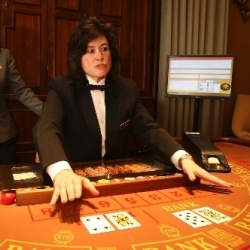
When Vegas Strip casinos needed the boost in 2010, baccarat was a boon to the local gaming operators.
For the second month in a row, Las Vegas Strip casino giants will have to apologize for declines in “gaming win”. While revenues statewide increased 1.2% in September, gaming win on the Vegas Strip was down 7% in the month.
During conference calls to discuss the August 2018 numbers, executives from Caesars Entertainment and MGM Resorts were apologetic to shareholders about a 6% decline. At the time, the execs warned that the coming months would be challenging.
That appears to be the case. Declining baccarat numbers were a big part of the story, as they have been for some time.
As David G. Schwartz noted in his Forbes op-ed on this month’s numbers, the Vegas Strip has shown a 30% decline in baccarat revenues over the past 5 years.
First Month of Growth Since June
Overall, the gaming revenue news was good. For the first time since June, the overall gaming revenues had increase year-to-year. Slots revenues were up 2%, with 2% a huge total when slots represents the biggest slice of the pie. But as Schwartz noted, the baccarat decline is a longstanding trend which needs to be explored.
Baccarat was a boon during the Global Recession. As domestic retail play cratered, baccarat revenues soared. Baccarat is the favorite game for Asian gamblers, especially the Chinese high rollers who sustained a huge ten-year growth cycle in Macau and who accounted for Las Vegas’s baccarat growth.
Since 2013, though, baccarat numbers have decline from $116 million a month to $69 million. The loss of $35 million to $40 million a month on a certain game is nothing to sneeze at.
Baccarat Revenues’ 5-Year Decline
Especially since mid-2014, when the bulk of the decline started, the loss in baccarat numbers is attributable to a crackdown against corruption among China’s wealthy elites. Conspicuous consumption was a bad idea during the era of Xi Jinping’s corruption crackdown. So was capital flight from the mainland, so Chinese VIP players were less likely to show up — or at least spend as much when they did.
Gaming revenues about for less than 40% of Las Vegas Strip total revenues these days, but that doesn’t mean the gaming receipts are unimportant. The Strip’s gaming revenues has a higher margin than profits from restaurants, hotel rooms, or retail shopping. The potential for huge gains is that much greater.
Advertising Casinos in China
The problem is it takes an investment of money and resources to draw in the international high rollers, especially from Asia. Expensive flights, emperor suites with butler service, and overseas advertising are what woo Chinese VIPs.
Advertising in China is complicated. As Australia’s Crown Resorts learned to their dismay in 2016, gambling advertisements on the Chinese mainland are fraught with peril. It is illegal to advertise for a gambling resort; the most you can do is advertise for the city your casino resort sits in. You can spend a huge budget to draw customers to your casino competitor across the street.
Slots Revenues Remain the Key
Faced by the new reality, Las Vegas Strip casinos might be forced to rely on domestic retail play again. Slots revenues are not sustainable long term. Since 2016, millennials have the most spending power of any generation now, but they don’t like slots row nearly as much as their predecessors. But slots row still is the most sizeable and reliable revenue stream in Las Vegas casinos these days.
Appealing to domestic customers might means an end to paid parking and resort fees, which are seen by American mass market gamblers as a way to gouge customers. As it is, casino executives explained in this week’s conference call that they expect a better 4th quarter, due to convention bookings and other end-of-year events.
This year’s numbers would not be that concerning, except casino companies these days are publicly-traded multi-billion dollar corporations. Companies need constant earnings growth. The big four casinos giants — Caesars Entertainment, Wynn Resorts, Las Vegas Sands, and MGM Resorts — must perform to their shareholders and have to account for declining baccarat revenues or other such factors.
